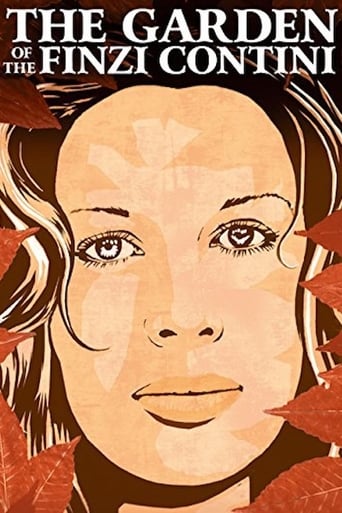
In addition to making several forgettable commercial films, Vittorio De Sica also made two of the most touching and heartfelt movies that I have ever seen. The two movies are, “The Bicycle Thief” and the even better, “Umberto D.” It was not until he dealt with the culpability of Italy in the Holocaust, eighteen years after he made, “Umberto D”, that De Sica would once again tear at my heart with a stirring drama. The film he made in 1970, is the award winning, “The Garden of the Finzi-Continis”.
Finzi-Continis is the name of an upper-class Jewish family in Ferrara, Italy. They live in a grand walled estate, where they have built their very own tennis court. As the film opens, the young brother and sister Alberto (Helmut Berger) and Micol (the wonderful Dominique Sanda) have invited all their friends to play tennis at the estate, because, as Jews, they have been restricted from playing in a regular tennis club. This is the late 1930’s and Mussolini’s fascists are ruling Italy. Their friends are a mix of Jewish and Gentile young people from the well to do families of Ferrara. One of their friends is the Jewish Giorgio (Lino Capolicchio), who was a childhood friend of Micol and is now madly in love with her. The movie’s first scene is shown in a light and carefree fashion and belies the events that will soon change the lives of all the characters. Giorgio comes from an upper-middle class family who are alertly aware of the changes happening around them. Their proactive approach will work to save at least one member of the family. The Finzi-Continis on the other hand, believe that their money and high standing will shelter them from the inevitable. The ending, as in all movies concerning the Holocaust, is tragic and full of despair.
Micol sees Giorgio more as a brother than as a lover, and this reality breaks his heart. At one point, he is told that to truly live, a person first needs to die of a broken heart, and that it is a good thing that it happened to him at such a young age. It is a prophetic statement that drives the film to its somber conclusion. Micol for her part, has an affair with Giorgio’s Gentile communist friend Giampiero (Fabio Testi), who ironically gets drafted by the Fascists and is sent to the Russian front. One of the movie’s strong points is how it effectively shows the different ways war affects diverse people.
The cast of the film are all outstanding, but special mention needs to be made to the performance of Dominique Sanda as the headstrong and privileged Micol. Micol knows that she is attractive and uses it to her advantage by flirting freely and knowing exactly when to turn away from the man she is driving crazy. Sanda succeeds in not only portraying this woman as being a self-aware privileged waif, but also in making her likeable. She is more than anyone else in her family represented as someone who thinks that they are immune to the events occurring around them. She has an affair with a handsome non-Jew and behaves as if nothing is changing. At the same time, I always got the impression through her eyes that she was fully aware of the darkness of her family’s situation.
Georgio’s family, on the other hand, are not only aware of what is occurring but act in different ways to counter its effects. Giorgio is rightfully angered, his brother is scared, and his father tries to stay philosophical and careful. The father is cast by the great Italian actor Romolo Valli and his performance is one of my favorites in the film. He is a good man and a loving father. He strives to protect his sons above everything else, including himself. Valli has a soft, kind face that is perfect for the role.
This is a movie about the Holocaust and assumes that the viewer already has knowledge of the horrific nature of the concentration camps and mass killings. It is a movie that shows life before disaster. To make sure we are aware of the danger that lies in wait for the Jewish people of Italy, De Sica throws in a scene where Georgio’s brother speaks to a communist who was temporarily interned in a concentration camp. If he was Jewish, he would not have lived to tell his tale.
By mixing exquisite atmosphere, great character development, and superb performances, De Sica, with, “The Garden of Finzi-Continis”, has created a fascinating window into the disintegration of the once thriving Jewish community of Italy. It is a powerful piece of filmmaking.

